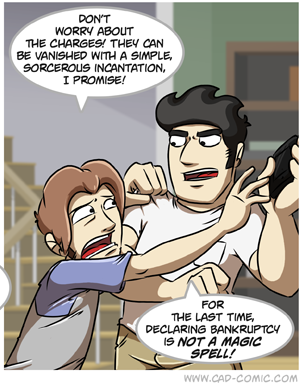Student Loans have entered the chat.
And medical debt.
I don’t think so, or at least is state dependent, I definitely had medical debt and it was definitely discharged along with all the other debt I had
Yeah medical debt is dischargable, our lawyer asked if we had any surgeries we had been putting off that we might want to get done before we filed.
This is a remarkably dystopian statement lmfao
USA!
USA!
USA!Guns are easier to get than surgery. Shoot your problems away!
Isn’t this some flavour of fraud? Not from the US, so this is all pretty bizarre to me.
Capitalism is a flavor of fraud in and of itself.
If buying isnt owning, piracy isnt stealing.
Yes, but its fraud in a system designed at every level to defraud you, so fuck um. Get healthy in any way you can because the system itself sure won’t help you.
They screw you, you screw them is the American way, so bravo for the lawyer for being honest about the game.
Depends on if you think it’s stealing to steal from a thief.
It is all fun and games until the repo man comes to rip those knee replacements out.
In my country that isn’t a thing. Everybody has to have private insurance and if they can’t afford it, the State subsidizes it.
And if somehow you get something done that isn’t covered by the insurance, they can’t pursue you for that debt and it doesn’t show up when doing things like getting a lease.
It’s not perfect (insurance costs a ton and keeps rising) but at least it’s not some dystopian nightmare where people can’t afford to get care in one of the World’s top economies.
What is student loans?
Money you have to take out for college and then pay back at 10% interest.
I’m sorry is this an I-love-getting-fucked-in-the-ass thing that I’m too Scottish to understand?
Yes.
See, Americans dont have an England to fuck over its citizens, so we have to do it all by ourselves.
And then blame it on the boogieman
And who’s fault is that?
They put the mugshots on their paper money.
I’m sorry is this an I-love-getting-fucked-in-the-ass thing that I’m not USA enough to understand?
FiFY, now the entire world can use it
[Laughs in English]
Whilst it would be lovely if us Englishmen didn’t have student loans, they could be a whole lot worse. We only pay them once we earn over a certain threshold, and they’ll disappear after 30 years. Plus our unis are funded in large part by international students (which has its own issues), so Brits’ course fees are slightly subsidised.
Not good, but hey at least it’s not the US(!)
You missed the chance to say “At least it’s not the US, eh?”
The United States is a free country and freedom to shape your own destiny is one of the hallmarks of being an American. So everyone whining about how hard it is should have thought long and hard about the consequences of their actions when they decided not to be born rich.
/s
Discover and chase have entered the chat as well
Imagine being inside a month😵💫
🥵
July is hot, what’s your problem?
We’re inside the month filling the bankruptcy
I got talked into bankruptcy (by a bankruptcy lawyer, surprise surprise). It cleared $12k of credit cards and bank fees but not the then-$50k of student loans and the spending habits that were the real problem. Now I learned my lesson. No credit cards. Save up and pay. Have an emergency fund that can cover your expenses for months and months in the event you lose your job, or your most expensive unplanned repair. That’s the real life saver.
Credit cards are fine for people who can control their spending. I never pay interest, so I get my rewards for free and am building my credit. If you cannot control your spending habits, you might consider a card with a low limit.
You mean you never pay interest by paying off the debt before the next billing cycle, right? Or is it fine to get zero interest for whatever amount of months on certain purchases?
We do both… both are fine. As long as you aren’t paying fees or interest, there is no disadvantage to using credit cards.
Ah, okay, I always figured the only way to really be responsible with credit was to use credit cards like debit, but if a big purchase came along that I definitely couldn’t pay off within the month, I figured it wouldn’t hurt to have zero interest but wasn’t sure of the impact on my credit.
As long as you have the discipline to actually pay the thing off it’s fine. Many people think, “oh I have 0% interest, I’ll pay it off later” but never set aside the money to do so and end up accruing interest.
I never buy something on them I couldn’t immediately pay off in full when I hit buy. I’ve bought things in excess of my checking balance, but that’s because I had enough in savings (separate from my emergency fund), and my incoming paycheck would put my checking balance well above my credit card balance.
That’s more or less the right way.
Use credit cards for everything for an automatic minimum 2% discount on all purchases (in the form of cashback or rewards depending on how you value them, and more if you optimize category spending…I.e. you have a certain card you use for gas or groceries or eating out because that card has the best rewards for that category). Enjoy sign up bonuses if you can responsibly make the spend requirement. Always pay off statement balance and never close accounts (downgrade/product-change to free cards if the benefits aren’t more valuable than the annual fee).
And enjoy 0% offers but never slip on payment because that’s how they get you. If it’s not paid in full in time or a payment is late they will charge you backdated interest. 0% financing is free money if you can afford it (and can use it) at this inflation rate. I’d been on the fence about replacing my aging appliances but 0% for 24 mos made that a no-brainer. I could afford to have bought those appliances with cash (it’d sting but it’d be doable), but I’d much rather keep that few grand in a CD or bond or mutual fund and pay a 23rd of the balance every month, making me money instead of the bank.
You lost me a little with that last part, I’m assuming that’s more about investing, but I can understand weighing the options between an annual fee and rewards.
That is pretty much the right way to do credit. Treat like debit and/or find a way to have 0% interest over a few months time to spread a big cost across multiple months where it becomes affordable.
My concern is the impact on my credit from not paying back in full, even if there’s zero interest for an extended period of time. Like paying an appliance in 3 months with no interest versus the full balance before the next billing cycle. I just assume there’s a downside to having that convenience aside from them hoping I’ll fall behind.
Short term credit balances like appliances paid off over 3 months don’t affect your credit for very long. As soon as they are paid off and the balance falls off your credit report your score will rebound. It’s not worth stressing about.
Personally, I pay off before next billing cycle. However, I have been fortunate with my finances. I know friends of mine who carry credit card debt, and they have successfully managed to balance transfer from one card to another using periodic balance transfer deals that let you transfer all your debt from one credit card to another with a 0% interest rate for 12 months or so. They have managed to do this for years.
So there are definitely a variety of options!
I used to feel this way with 2% cash back, but I don’t think it’s worth the privacy loss of giving a for-profit corporation all of my spending data. Where I live now, almost no one accepts credit cards in person & if they do, there’s a high minimum payment & you will be paying the transaction fee. After getting used to carrying cash again, I can confidently say I prefer the anonymity. What weirder in hindsight is many other places either not accepting cash or baking the credit fees into the prices so it’s cash payers getting screwed—meanwhile the credit companies get to skim fixed costs while providing minimal value.
Yes, you definitely need to be vigilant these days about the fees. A lot of places are passing the costs to customers or offering lower prices for cash and debit.
In France after high school you pay 170€ the first 3 years the 243€ the next two, 100€ more each year if you don’t have aides from the government. Some engineering schools (~600€) or private schools are more expensive.
That’s a total of 1496€ for a 5y curriculum at most, if you don’t have any aides. (810€ for a shorter 3y one)
For reference the monthly minimum wage is 1398.69€ (without tax).
So if you work two months at McDonald’s you can literally pay your entire education with enough room to spare if you didn’t pass some years.
(Engineering schools is more but it isn’t crazy either)
That’s without any help, but we have some cheap apartment specifically for students, help to pay the rent. And in addition to this you can get a sizable amount depending on the income of the parents, sometimes enough to live on.
So why in the hell would you pay 50k. That’s 33 times as much, guys just come to France, or the EU and your set lol
Everything you’ve said only stands for public university (which is better than private schools however). In the private world, you’re looking at ~10000€ a year.
So why in the hell would you pay 50k. That’s 33 times as much, guys just come to France
I believe it’s more expensive for foreigners to study in France now. You’re looking at ~3000€ per year IIRC.
Ho yes you’re right!
It used to be the same but they increased it in 2019. They passed a reform with a lot of changes to the whole education system (including high school which add a lot of changes).
The reform was pretty bad for a lots of reasons.
Should have thought of it, every university went on strikes for it, including mine (I was just on year 1).
They passed it anyway…
So yes now its 2770€ for the first 3y and 3770€ the next 2. Granted that’s still cheaper, 15,850€ total but that’s only 3 times more expensive, not as crazy.
P.S. Private school can be good especially in some fields, but they’re also a bit prestigious too. And 10k is a pretty good approximate i believe.
Around 3-5% is spent on textbooks alone
Your textbook is enough to pay for all of our education.
Did no one thought about having a library for that lmao.
P.S. Or more seriously on putting the material online.
I’m sure some people thought of it. But then everybody else thought “wait, but money!”
Room and board can be as much as another 20% depending on where you go.
The real cost is in living expenses though. A lot of kids still end up with 20-40k of loans after 3-5 years in school living on their own.
Sure, most people i know either have parents to help them, including some fund they made them, or get the aides for students (including cheaper and small apartment, help to pay the rent, cheap meal at campus and scholarship). Some have a mix of both like me.
It’s often a bit short anyway, it isn’t luxurious, but we deal with it, i never met someone that took a loan as a solution though.
But we still have living expenses in the US too, on top of the outrageous tuition costs. My bachelor’s degree cost $58,000 but during those 4 years I also worked two jobs just to pay for rent and food and keep my car working. I’ve been out of college for over 10 years btw and still owe $40k in student loans.
How has bankruptcy affected you when you’ve gone to apply for things? Has there been any real long term effects when you apply for like a house or car loan?
I was able to get a car loan a few years after the bankruptcy. It was dumb, I hadn’t fully figured out my money situation yet. Bankruptcy didn’t fix that spending habit. But that was the tipping point. When my minimum expenses between the car, student loans, and living expenses exactly equaled my salary, I started trying to beat my way out of the mess. The car I currently own, I paid for up front. By the time I bought a house, the bankruptcy had disappeared off my report. Now the plan is pay off the mortgage and never have a credit score again.
After 7 years the bankruptcy disappears from your credit report. After that it’s like it didn’t happen.
Bankruptcies fall off your credit report after 7 years. I think the only thing you are blacklisted from after that 7 year period is the bank that credited you and lost money.
Nice Try Rudy. Pay your debts.
Nice try, but Rudy isn’t filing for cc debt.
“I declare BANKRUPTCY!!!”
filling for bankruptcy
inside a month
Go back to school

Most individuals still have to work out a debt repayment plan. I know some credit cards and loans still have to be repayed even in bankruptcy. Chapter 11 bankruptcy is only available if you’re a corporation or a kajillionaire.
This is just not true.
But it’s on the internet?
Fair point.
Which part is untrue? Didn’t they change the rules of bankruptcy like a decade ago or something?
It used to be that you could get all your loans discharged and in essence just end up with a really bad credit score. I thought they changed it so people still had to pay their debts off even if they declared bankruptcy.
Unsure if it applied to corporations though.
That’s chapter 7. There are some debts that cannot be wiped out via bankruptcy. That’s true for corporations too. And when it happens, they get liquidated.
You can’t really liquidate a person and cease it to be an ongoing concern. The dynamics are different.
Chapter 11 can and does get filed by people - but it’s a reorganization, and buys you time to negotiate with the debt holders if able for a reduced amount or a longer repayment plan or reduced interest instead of going through chapter 7 where they’ll get nothing or very little if it’s unsecured debt.
Both will tank your credit.
Maybe you can’t liquidate a person.
Soylent is people.
I’ve been through it and the attorneys involved stated up front, no individual can apply for “Chapter 11” bankruptcy, and then they proceeded to give me the current literature about state law. Maybe it’s differerent from state to state, but where I live individuals are not allowed to file for Chapter 11 bankruptcy.
Everyone I’ve talked to that went through what I did was required to file for Chapter 7 bankruptcy instead. And yes it did tank my credit, until I paid off the bankruptcy and had it discharged. Then suddenly I was getting notices about “preapproval for credit” once again (which I totally disregard, I’m not going through all that again!).
It does not vary by state. Usually 7 or 13 are better/faster for individuals - but there’s no reason you can’t.
Sounds good.
deleted by creator
What isn’t true that I was replying to is that chapter 11 bankruptcy is only for corporations and gazillionaires. Regular people can use 11 to their benefit often - especially if they aren’t so far in the hole they can’t see daylight.
Secured debt can be discharged without forfeiting the collateral by paying it off or coming to a new arrangement in a chapter 11 proceeding.
While there is a lot of discretion judges get in the vast majority of 7 or 13 proceedings, unsecured credit holders are entirely wiped out, or very nearly. Each individual case is different of course.
Bankruptcy debt settlement are usually for a fraction of the stated amount. I’ve heard of families who have discharged over 100k of cc debt and only had to pay about 10k. Usually you will lose bigger assets like vehicles, but keep your home.
You can and will lose your home in many many states (non homestead states primarily). If the person you aren’t paying is your mortgage holder, you’re definitely going to lose your home You will also almost always lose non-primary residences provided they need to be liquidated to settle your debts. You will be given any excess money from the liquidations after your debts are settled.
If you’re settling debts you’re probably doing chapter 11 not 7.
Chapter 11 requires your lenders to play ball, but if they think they can make more money by extending terms of offering a discount than if they force you into chapter 7, they will.
If you make $5k/mo and your living expenses are $3k/mo and you have $3k/mo of debt for the next 30 months, reasonable lenders would look at that and say I’d rather have $1.5k for 60 months and I believe you can pay it rather than rolling the dice in chapter 7 on what assets you have or don’t have and what they’re worth when they finally get liquidated.
If only. Most people who need bankruptcy can’t afford the lawyer required to do it.
I see bender (over drake) i hit up like
Useless endeavor if the individual in question doesn’t change their spending habits. Be right back fucked again in a few years.
Can you declare bankruptcy again?
Pretty sure Trump has done it 4 or 5 times. Those were company bankruptcies by a nepo baby, though, so probably not the same rules as regular people 🤷
Given the effect it has on credit score, it will perhaps be more difficult to accumulate debt — it will be harder to take out large credit card, mortgage, or other loans. Probably not applicable to medical and whatnot.
In theory I think it makes sense: loans should be a privilege not a right, or something like that. But in reality, loans are essentially required for modern life, at least in the US. So the people who can least afford it end up with loans with ridiculous interest rates (even if the total loan amount is smaller than it would be pre-bankruptcy).
I am fortunate enough to be able to pay off my credit card every month, so the interest rate doesn’t really matter. It’s a great, but dystopian, example of positive feedback: those who can afford pay less (no interest), and those who can’t afford pay more (interest).
Could you please elaborate on the claim that loans are essentially required for modern life in the US? You might be able to make the argument for a mortgage but even that is not absolutely required. Possibly student loans could be seen as required but those are largely government subsidized/administered and typically given out to younger people who haven’t yet gone through a bankruptcy.
Credit cards, for instance, are not required but extremely useful. For instance, my recollection is that when booking hotels or rental cars with a debit card they will put a hold on your account for collateral. This could be a problem if you’re living paycheck to paycheck. If you have a credit card, you may get a hold as well — but this is just reducing the amount of available credit. Functionally this is the same, if you have enough money, but if you’re living on the edge and your rent money is in your checking account, this is pretty unfortunate in the case if a debit card.
Additionally, credit cards offer consumer protections, including chargebacks. My understanding is that debit charges are much more difficult to dispute.
And, in the US, for many people not in urban centers, owning a car is essential for life/work. Quick Google search claims, in relation to savings, “The median balance for American households is $5,300.” So if your car bites the dust, buying a new (used) car may not be possible without a loan.
You’re right though, it’s certainly not literally required.
7 year cool down, and unless you are Trump and can afford extremely expensive legal representation, your odds of actually getting a full discharge of debt go down.
Yes, there is NO limit on the number of bankruptcies you can file for. However, there are time limits between filling dates. Here’s what a Forbes article mentions about it:
Just as there are different types of bankruptcy, there are different rules for how often you can file bankruptcy. The waiting period to file another bankruptcy case generally ranges from two to eight years, depending on the type of bankruptcy. In some situations, there may be no waiting period.
However, good luck getting creditors for years after filing for a bankruptcy. I imagine very few will trust you / loan you money, except for the most predatory (i.e. loan sharks). And if you did go with a predatory source, a future bankruptcy may not help you discharge the debt given predatory sources commonly operate outside of the law.
Why don’t you just not buy a credit card? Or do you need it to have a credit score?
well at this point he’s 50 years old and he’s paying off a bunch of credit cards. I think you’re supposed to be giving that advice to 18-year-old him. Not 50-year-old him.
The idiotic catch-22 of credit, you need to use credit you don’t need in order to prove that you can pay back credit you do need.
Eg good luck getting a car loan or a mortgage at a reasonable rate if you don’t have credit history.
Ironically OP could probably absolutely qualify for a loan despite barely being able to pay off debts, because lenders want to make money off of you more than they want you to pay back their loans on time. Late fees and interest 🤑
Filing for bankruptcy is offloading your responsibility to others who then have to pay with their money for your faults.
It’s a cheap way out for people that do not act responsibly.
Bankruptcy? Okay, but then lose all saying in your money spending because you just proved you can’t handle it yourself.
you do realize that bankruptcy does have consequences, right? for one, it’s nearly impossible to find a new place to live if you’ve ever declared bankruptcy. If you work in certain sectors, you can lose your job. if you’re a government worker, you’d lose your security clearance or probably even a public trust. If you lose your job, new companies that might hire you would likely do a credit check for some reason and find you unqualified because of that bankruptcy.
So it’s double-triple bad to have debt? Then manage the finances, assess the risks, cut unrealistic expectations that will toss you into the debt spiral, because it’s triple-bad. Who is to blame?
Poor banks :( The irresponsible poors need to do things the right way, and lobby congress to bail them out.
Can you please explain briefly plz bro. I know pretty much nothing about bankruptcy.
The average credit card interest rate is 25%. Yes people shouldn’t borrow money they can’t pay back. However that doesn’t change the fact that interest rates on credit cards are wildly high and entrap people in a loop of only paying the interest off. Bankruptcy is their only hope of escape from that debt cycle.
People “spend irresponsibly” for a ton of reasons like medical expenses, paying for a funeral, having mental illnesses that they don’t even know about, etc. Life happens.
They received money from a rich guy or corporation who knows of the risk of their money going “poof.” Creditors aren’t mom-and-pop shops, and they will survive if an investment doesn’t go well. The same cannot be said for the person in deep credit card debt. Oftentimes, the lenders are the ones who have predatory practices and purposefully make it easier for peoples’ debt to spiral out of control, and you shouldn’t feel bad for those lenders.
About these unexpected costs:
-
medical insurance is a must, otherwise you are gambling and the chances to lose this bet are quite high.
-
funerals happen unexpected - when they actually absolutely do not. Everybody can be sure to die, so plan accordingly.
-
being “in deep credit card debt” is too late. One should never have swam out this far. Being “a tiny little bit in debt” should have the alarm bells blasting as financing is not self sustaining, “a tiny litte bit” is already much too late already because you’ve entered the spiral
-
student debts - well, not everybody has to study. If you can’t afford it reflect on it, if you really must. And if yes, seek alternatives like leaving the country tht is hell-bent to enslave you in debt if you want to study, find sponsors, arrange it with your expectations about a longer time horizon, etc. You are not able to pay for it? Do not do it! Seek solutions.
medical insurance is a must, otherwise you are gambling and the chances to lose this bet are quite high.
You can still have deep medical debt with good insurance. Saying otherwise is incredibly wrong and out of touch. This also ignores how good insurance is inaccessible to a good chunk of the population.
funerals happen unexpected - when they actually absolutely do not. Everybody can be sure to die, so plan accordingly.
Explain how someone who has 0 room in their budget after food, rent, and utilities can plan for the costs of a sudden death. The situation I described is incredibly common in America.
- being “in deep credit card debt” is too late. One should never have swam out this far. Being “a tiny little bit in debt” should have the alarm bells blasting as financing is not self sustaining, “a tiny litte bit” is already much too late already because you’ve entered the spiral
Please explain how to avoid credit card debt when basic necessities cannot be obtained with the income you have. Assume that you can’t get a 2nd job because of child or eldercare duties.
- student debts - well, not everybody has to study. If you can’t afford it reflect on it, if you really must. And if yes, seek alternatives like leaving the country tht is hell-bent to enslave you in debt if you want to study, find sponsors, arrange it with your expectations about a longer time horizon, etc. You are not able to pay for it? Do not do it! Seek solutions.
This would leave college inaccessible to the vast majority of students, especially from lower income families. Not going to college isn’t a solution when well-paying jobs require college degrees.
Your “solutions” in 2024 are essentially blaming lower-income individuals for being lower income individuals. Oftentimes, these lower-income individuals are lower-income because they were born into lower-income families and had fewer opportunities to become wealthy as a result. In 2024, basic necessities are inaccessible to many Americans because their wages aren’t high enough to meet the rising costs of these basic necessities. Their choice is to either suffer without basic needs and be able to afford less and less because their wages remain stagnant or to make poor financial choices to be able to live. Yes, the US has safety-net programs to help lower-income individuals gain more opportunities. No, these programs are not enough because they are underfunded, and the funds allocated to them are mishandled. No, it is not easy for individuals to get out of deep poverty. No, “don’t make even a single financial mistake in your life or you’ll suffer for 70+ years” is not a solution.
-
It’s irresponsible for banks to loan money, they pay many people salaries for risk assessment before loaning it. Also their loan is insured so even if you don’t pay it back they write the loss off.
Indeed. But they want to make money, so they rise the interest rate to make even more money and cut losses on failed debt repayments.
They solely exist to make money by extorting the people in debt. Who would have guessed?
So? Never have debts.
“Consumer” debts should ethically not exist as consumers just consume the money and are therefore not able to pay it back as it is not an “investment” debt, which has the chance to succeed.














